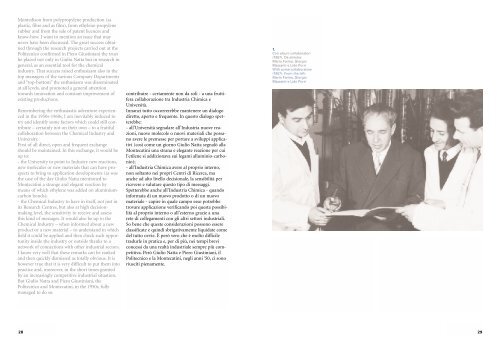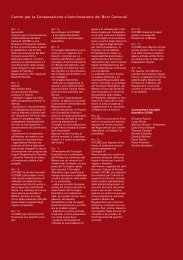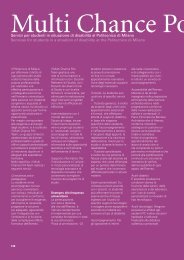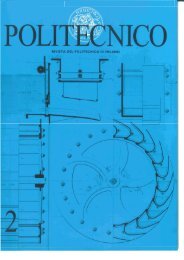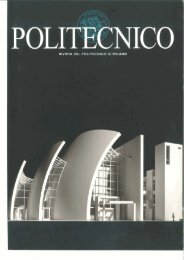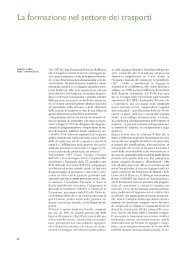Scarica il PDF (1959KB) - Rivista Politecnico - Politecnico di Milano
Scarica il PDF (1959KB) - Rivista Politecnico - Politecnico di Milano
Scarica il PDF (1959KB) - Rivista Politecnico - Politecnico di Milano
You also want an ePaper? Increase the reach of your titles
YUMPU automatically turns print PDFs into web optimized ePapers that Google loves.
Monte<strong>di</strong>son from polypropylene production (as<br />
plastic, fibre and as f<strong>il</strong>m), from ethylene-propylene<br />
rubber and from the sale of patent licences and<br />
know-how. I want to mention an issue that may<br />
never have been <strong>di</strong>scussed. The great success obtained<br />
through the research projects carried out at the<br />
<strong>Politecnico</strong> confirmed in Piero Giustiniani the trust<br />
he placed not only in Giulio Natta but in research in<br />
general, as an essential tool for the chemical<br />
industry. That success raised enthusiasm also in the<br />
top managers of the various Company Departments<br />
and “top-bottom” the enthusiasm was <strong>di</strong>sseminated<br />
at all levels, and promoted a general attention<br />
towards innovation and constant improvement of<br />
existing productions.<br />
Remembering the enthusiastic adventure experienced<br />
in the 1950s-1960s, I am inevitably induced to<br />
try and identify some factors which could st<strong>il</strong>l contribute<br />
– certainly not on their own – to a fruitful<br />
collaboration between the Chemical Industry and<br />
University.<br />
First of all <strong>di</strong>rect, open and frequent exchange<br />
should be maintained. In this exchange, it would be<br />
up to:<br />
- the University to point to Industry new reactions,<br />
new molecules or new materials that can have prospects<br />
to bring to application developments (as was<br />
the case of the day Giulio Natta mentioned to<br />
Montecatini a strange and elegant reaction by<br />
means of which ethylene was added on aluminiumcarbon<br />
bonds);<br />
- the Chemical Industry to have in itself, not just in<br />
its Research Centres, but also at high decisionmaking<br />
level, the sensitivity to receive and assess<br />
this kind of messages. It would also be up to the<br />
Chemical Industry – when informed about a new<br />
product or a new material – to understand in which<br />
field it could be applied and then check such opportunity<br />
inside the industry or outside thanks to a<br />
network of connections with other industrial sectors.<br />
I know very well that these remarks can be ranked<br />
and then quickly <strong>di</strong>smissed as totally obvious. It is<br />
however true that it is very <strong>di</strong>fficult to put them into<br />
practice and, moreover, in the short times granted<br />
by an increasingly competitive industrial situation.<br />
But Giulio Natta and Piero Giustiniani, the<br />
<strong>Politecnico</strong> and Montecatini, in the 1950s, fully<br />
managed to do so.<br />
28<br />
contribuire - certamente non da soli - a una fruttifera<br />
collaborazione tra Industria Chimica e<br />
Università.<br />
Innanzi tutto occorrerebbe mantenere un <strong>di</strong>alogo<br />
<strong>di</strong>retto, aperto e frequente. In questo <strong>di</strong>alogo spetterebbe:<br />
- all’Università segnalare all’Industria nuove reazioni,<br />
nuove molecole o nuovi materiali che possano<br />
avere le premesse per portare a sv<strong>il</strong>uppi applicativi<br />
(così come un giorno Giulio Natta segnalò alla<br />
Montecatini una strana e elegante reazione per cui<br />
l’et<strong>il</strong>ene si ad<strong>di</strong>zionava sui legami alluminio-carbonio);<br />
- all’Industria Chimica avere al proprio interno,<br />
non soltanto nei propri Centri <strong>di</strong> Ricerca, ma<br />
anche ad alto livello decisionale, la sensib<strong>il</strong>ità per<br />
ricevere e valutare questo tipo <strong>di</strong> messaggi.<br />
Spetterebbe anche all’Industria Chimica - quando<br />
informata <strong>di</strong> un nuovo prodotto o <strong>di</strong> un nuovo<br />
materiale - capire in quale campo esso potrebbe<br />
trovare applicazione verificando poi questa possib<strong>il</strong>ità<br />
al proprio interno o all’esterno grazie a una<br />
rete <strong>di</strong> collegamenti con gli altri settori industriali.<br />
So bene che queste considerazioni possono essere<br />
classificate e quin<strong>di</strong> sbrigativamente liquidate come<br />
del tutto ovvie. È però vero che è molto <strong>di</strong>ffic<strong>il</strong>e<br />
tradurle in pratica e, per <strong>di</strong> più, nei tempi brevi<br />
concessi da una realtà industriale sempre più competitiva.<br />
Però Giulio Natta e Piero Giustiniani, <strong>il</strong><br />
<strong>Politecnico</strong> e la Montecatini, negli anni ‘50, ci sono<br />
riusciti pienamente.<br />
1.<br />
Con alcuni collaboratori<br />
(1957). Da sinistra:<br />
Mario Farina, Giorgio<br />
Mazzanti e Lido Porri<br />
With some collaborators<br />
(1957). From the left:<br />
Mario Farina, Giorgio<br />
Mazzanti e Lido Porri<br />
29


